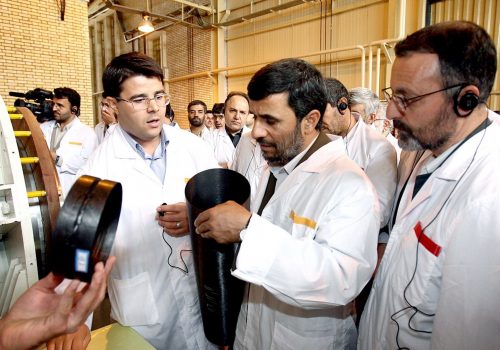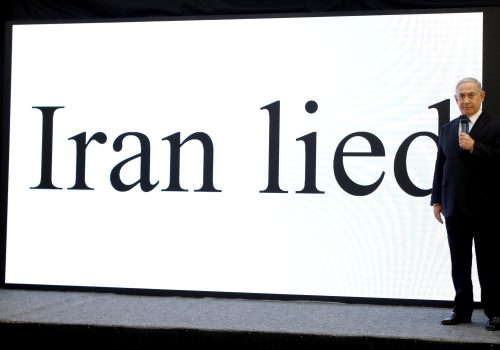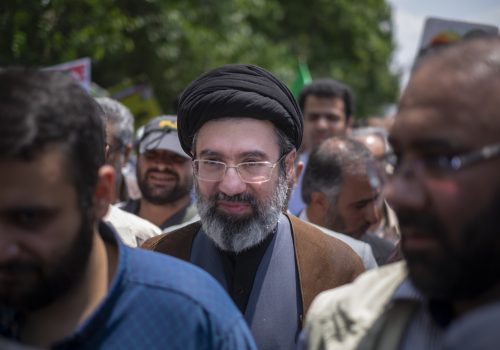Khamenei is the best option to negotiate over Iran’s nuclear program. The next Supreme Leader won’t be so willing.
Despite his tough and dogmatic image, Iran’s Supreme Leader, Ayatollah Ali Khamenei, has proven time and time again that he is willing to make ideological concessions on the nuclear issue if they serve the future of the Islamic Republic. Before the octogenarian dies, it is imperative to work on a long-term understanding between the West and Tehran regarding the country’s nuclear program, given that Khamenei’s replacement will not give relevant concessions to allow these understandings to last.
The Supreme Leader celebrated his eighty-fourth birthday this year on April 19. Khamenei is known to suffer from several medical problems—chief among them prostate cancer—but, at present, he still heads the clerical establishment. Even so, rumors of a deterioration in Khamenei’s medical condition increase yearly, as do public discussions about his possible replacement.
While Khamenei has not appointed a successor, there are a number of leading candidates in the name exchange—his son Mojtaba chief among them, as well as Iran’s current president, Ebrahim Raisi. At the same time, Sadeq Larijani, former head of Iran’s judiciary, is also mentioned. However, his chances are low due to the regime’s further radicalization and Khamenei’s activity to strengthen the conservative wing within the Iranian leadership.
Whoever will be elected Supreme Leader must work hard to consolidate his position. The possible candidate will have to focus not only on the relevant religious institutions—hoping to upgrade his religious title to ayatollah to accept the religious justification for ruling—but also gain the support of the Islamic Revolutionary Guard Corps (IRGC).
In addition to these facts, there is an understanding that Khamenei will work to prevent someone he perceives as a moderate (which he sees as posing a danger to the regime’s future), such as former President Hassan Rouhani or former Speaker of Parliament Ali Larijani, from being chosen as his replacement. This guarantees the election of a conservative leader from a more hardline school of thought.
Assuming this is the case, and considering the new leader’s need to accede to IRGC demands to please them, it seems that the initial moves of Iran’s future Supreme Leader won’t be able to satisfy the West.
It should be emphasized that Iran’s nuclear program has been in the most advanced states since its establishment. Iran has two protected enrichment facilities at Natanz and Fordow, where it enriches uranium to 60 percent while using advanced IR6 centrifuges. Iran is now a step away from enrichment to a military-grade level (90 percent). It has not yet gone that far, apparently out of fear of the international community’s reaction—not because it is technologically incapable of reaching this level of enrichment. In other words, if Iran’s future leader wishes to demonstrate leadership in the nuclear context, he will only have a few steps left to graduate to military-grade enrichment.
In order to prevent Iran’s future Supreme Leader from making dramatic progress in the country’s nuclear program to appease its conservative wing, it is right to take advantage of Khamenei’s tenure to reach a series of understandings that will not allow any future leader to cross the Rubicon in the nuclear context. This claim may be a surprise because Khamenei sought to build a nuclear bomb known as the Amad plan to ensure Iran’s future in the late 1990s and early 2000s. However, given the fact that Khamenei gave up his desire to obtain a nuclear weapon due to his fear of the price Iran would pay—especially the fear of an American invasion of Iran—it is possible that Tehran will not seek to obtain one during his tenure.
Moreover, over the past decade, and even more so between 2012 and 2013, Khamenei applied the term “heroic flexibility” to justify a direct dialogue between Iran and the United States that led to the 2015 Joint Comprehensive Plan of Action (JCPOA), which required Iran to roll back its nuclear program in exchange for sanctions relief. From its implementation in 2016, Iran under Khamenei fully complied with the terms of the agreement until the US withdrew from it in 2018. Even after the “great betrayal” of the US in Iranian eyes, under Khamenei’s leadership, Tehran has not stopped looking for ways to return to the original nuclear agreement. Recently, it seems that Iran is also willing to settle for a temporary understanding in exchange for some economic relief.
Moreover, despite its proximity to 90 percent enrichment, Iran has been careful not to cross the Rubicon in the current context. It has even increased its cooperation with the International Atomic Energy Agency (IAEA). Additionally, the world’s leading intelligence agencies assess that Iran under Khamenei is not carrying out any actions that indicate that it seeks to produce nuclear weapons. This is apparently why Iran has stopped its enrichment from reaching military-grade.
These facts suggest that it is of the utmost importance to advance a long-term arrangement with Khamenei on the Iranian nuclear issue before his death.
Given the plausible assessment that any elected leader will find it challenging to present a compromising policy vis-à-vis the West, an arrangement with Khamenei is becoming a preferred option to ensure that, regardless of the change in the Iranian leadership, its nuclear program will not expand.
It should be emphasized that Khamenei currently enjoys a broad consensus in Iran, and it is doubtful whether anyone can challenge his will or determination on strategic issues, including the nuclear issue. As Supreme Leader for three decades, Khamenei has a unique status with no one questioning his decisions. With this in mind, likely any decision Khamenei makes in the context of Iran’s nuclear program will be accepted and approved by the authorized bodies in Tehran without question.
This does not mean it will be easy to reach an agreement with Khamenei, who seems interested in an agreement but demands long-term guarantees to prevent a situation in which the United States leaves again. However, it will be much more challenging to reach such a deal with any future leader, who will have to gain the trust of the Iranian leadership. Therefore, he will likely demonstrate dogmatic policies for this purpose, enabling him to have the IRGC on his side. Thus, the West and Israel must see Khamenei not only as a threat but also as an opportunity—with all the difficulties involved—and strive to reach a long-term arrangement with him on the nuclear issue in his lifetime, thereby minimizing the danger that his successor will turn Iran’s nuclear program from civilian to military.
The fact that Khamenei still appears to want to seek a deal, even after the US withdrew from the JCPOA, illustrates his commitment to solving the Iranian nuclear file with political means. Khamenei will not forgo Iran’s nuclear capabilities, but his policy from 2012 onwards sought to achieve a political resolution, while he was willing to limit the program in exchange for economic relief. This behavior indicates that Khamenei has made strategic decisions in this regard.
Obviously, it will not be easy, and the US withdrawal from the nuclear agreement almost shut down this possibility and greatly strengthened elements in the Iranian leadership, such as current President Raisi, who seeks to rely on the East—China and Russia—rather than on the West—the latter of which they see as the enemy of the revolution. Still, despite the complexity and low probability, Khamenei may be the last chance to reach a long-term political solution to the Iranian nuclear issue.
Danny Citrinowicz is a nonresident fellow with the Atlantic Council’s Middle East Programs and the Institute for National Security Studies in Israel. Follow him on Twitter: @citrinowicz.
Further reading
Tue, Dec 8, 2020
A history of continuity in Iran’s long nuclear program
IranSource By Sina Azodi
Iran’s interest in developing a nuclear deterrent is often attributed to the Islamic Republic. However, in reality, this interest predates the 1979 revolution and reflects a deep-seated desire for national prestige and development, as well as a need to deter regional rivals.
Thu, Jan 19, 2023
Netanyahu’s Iran policy is expected to fail—again
IranSource By Danny Citrinowicz
The biggest problem that Israeli Prime Minister Benjamin Netanyahu has today is the fact that he will have a tough time rallying the Joe Biden administration.
Tue, Jul 11, 2023
Why Khamenei’s son is not the next radical modernizer in the Middle East
IranSource By
A cohort of regime elites are hoping that Mojtaba Khamenei will transform the Islamic Republic from above.
Image: Iran's Supreme Leader Ayatollah Ali Khamenei participates in the second night of the condolence council of Abu Abdullah Al-Hussein Iran s Supreme Leader Ayatollah Ali Khamenei participates in the second night of the condolence council of Abu Abdullah Al-Hussein in Iran on July 25, 2023. Photo by Iran's Supreme Leader/APAimages


